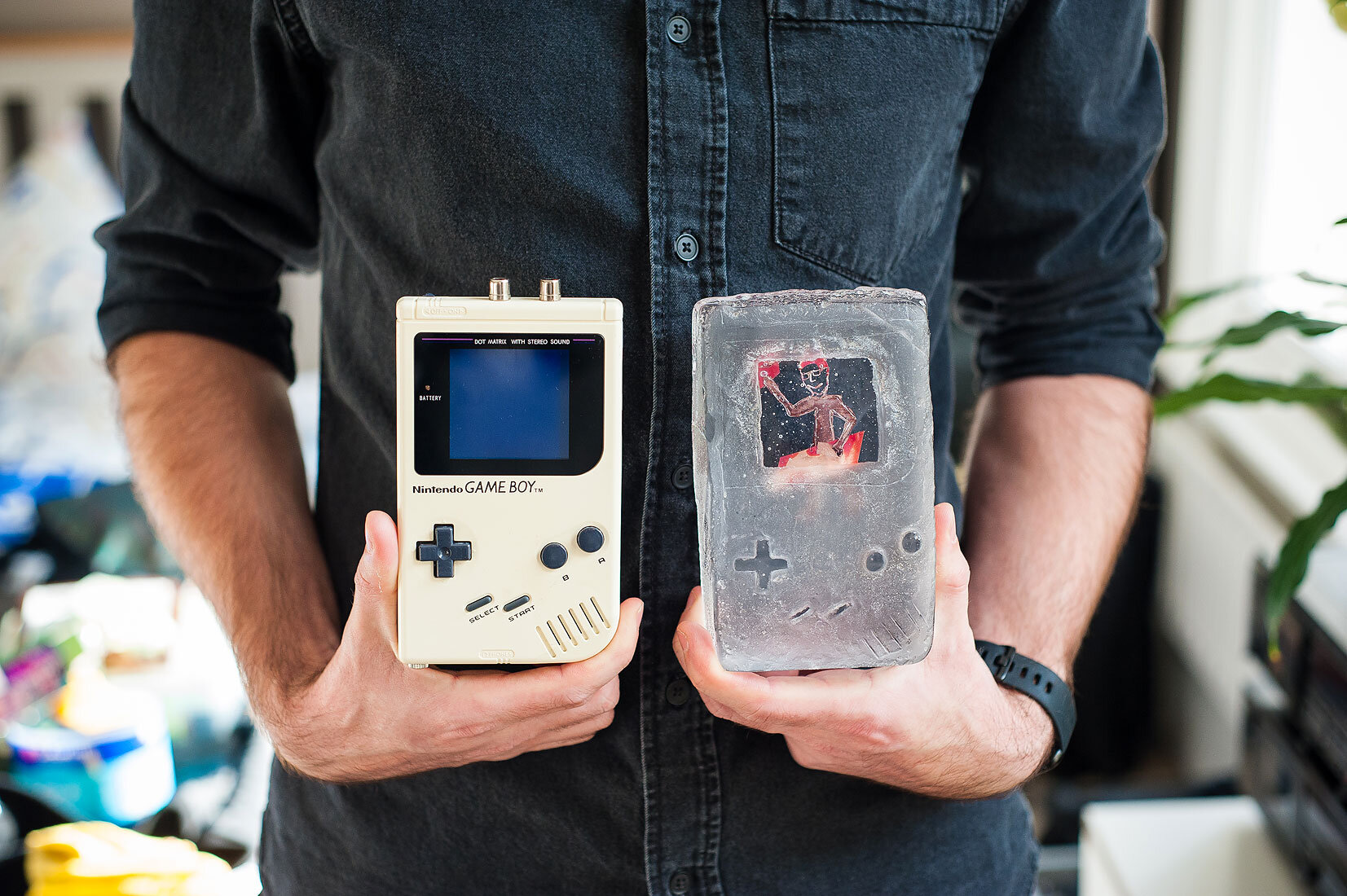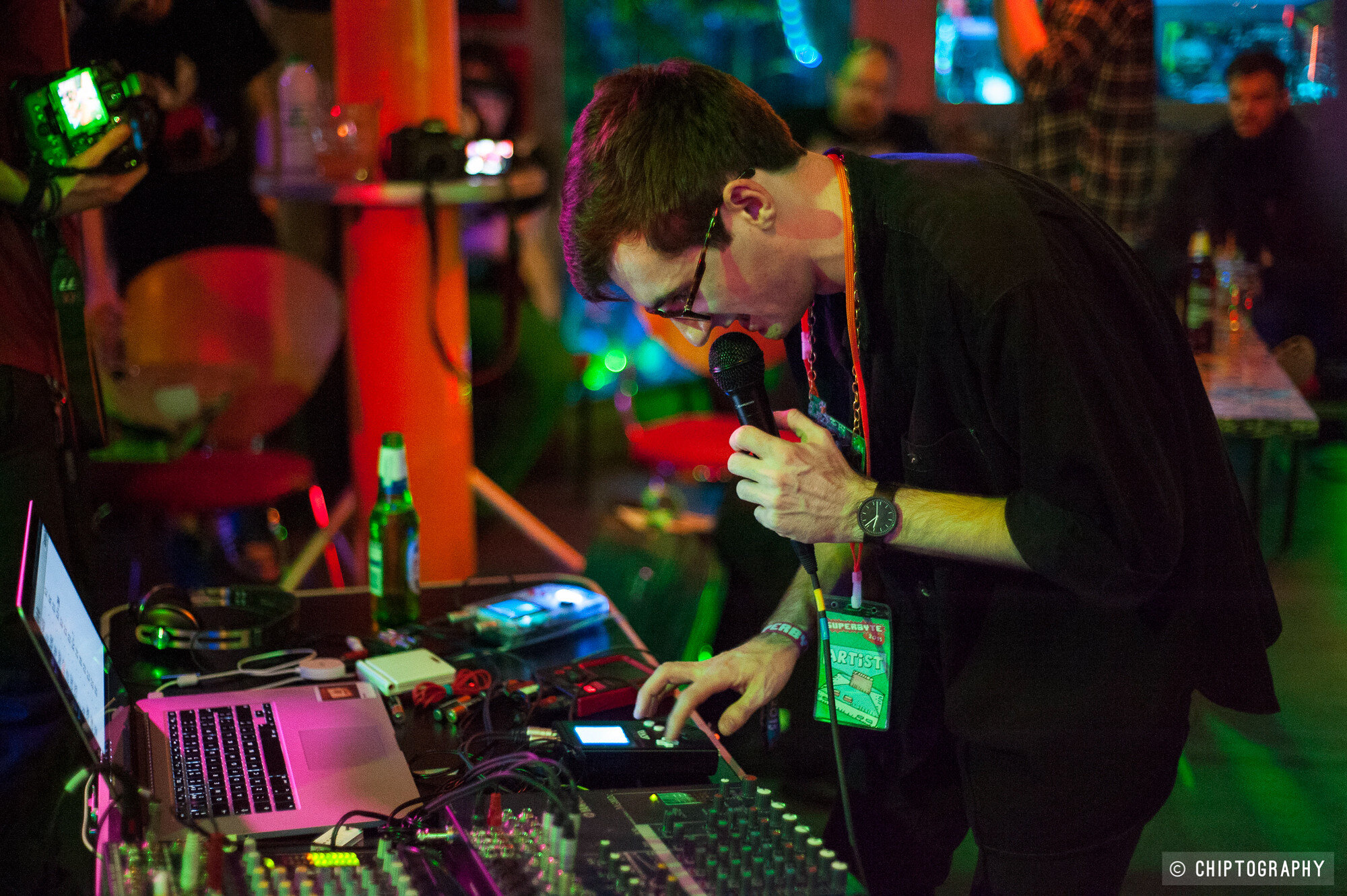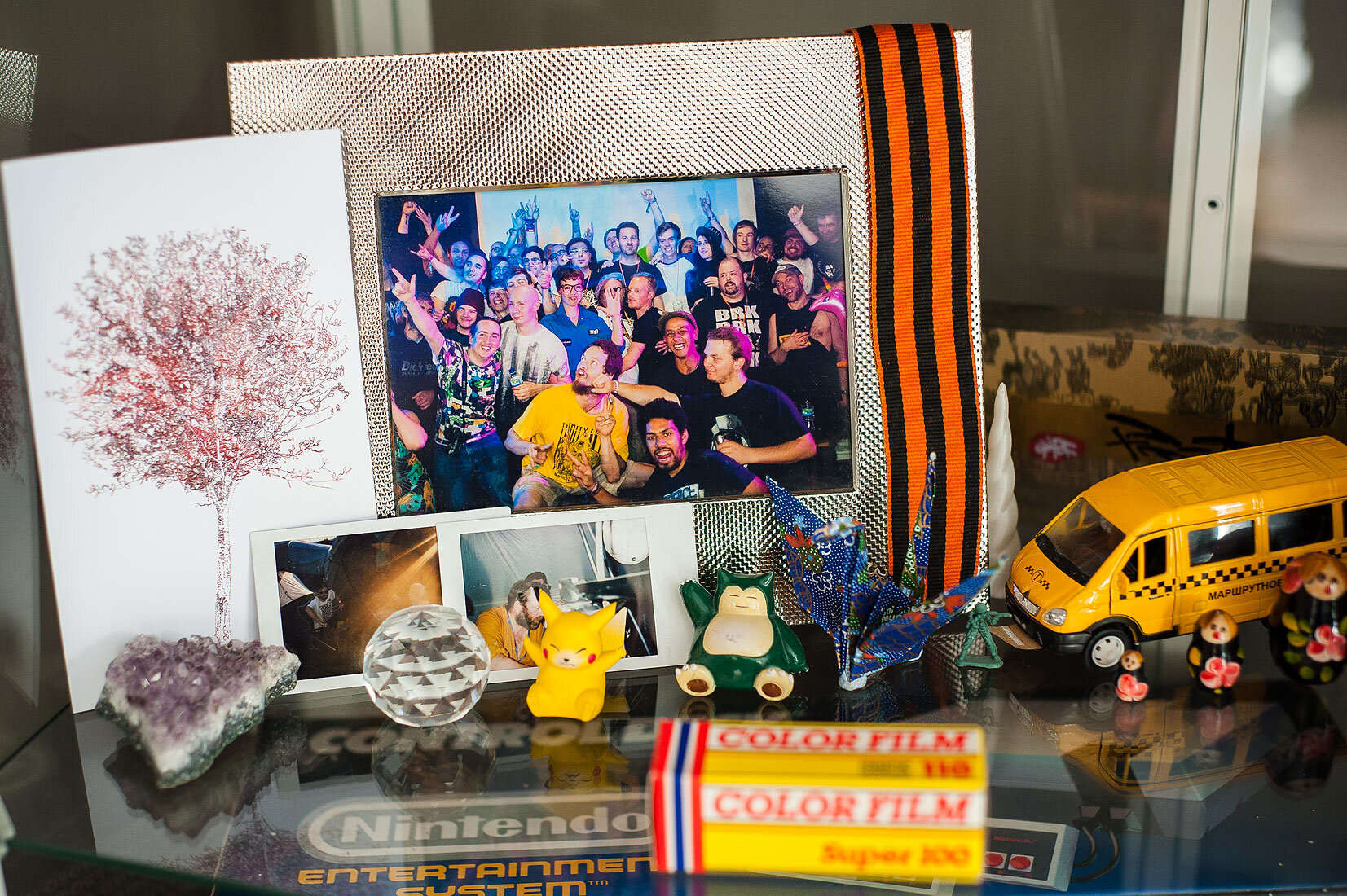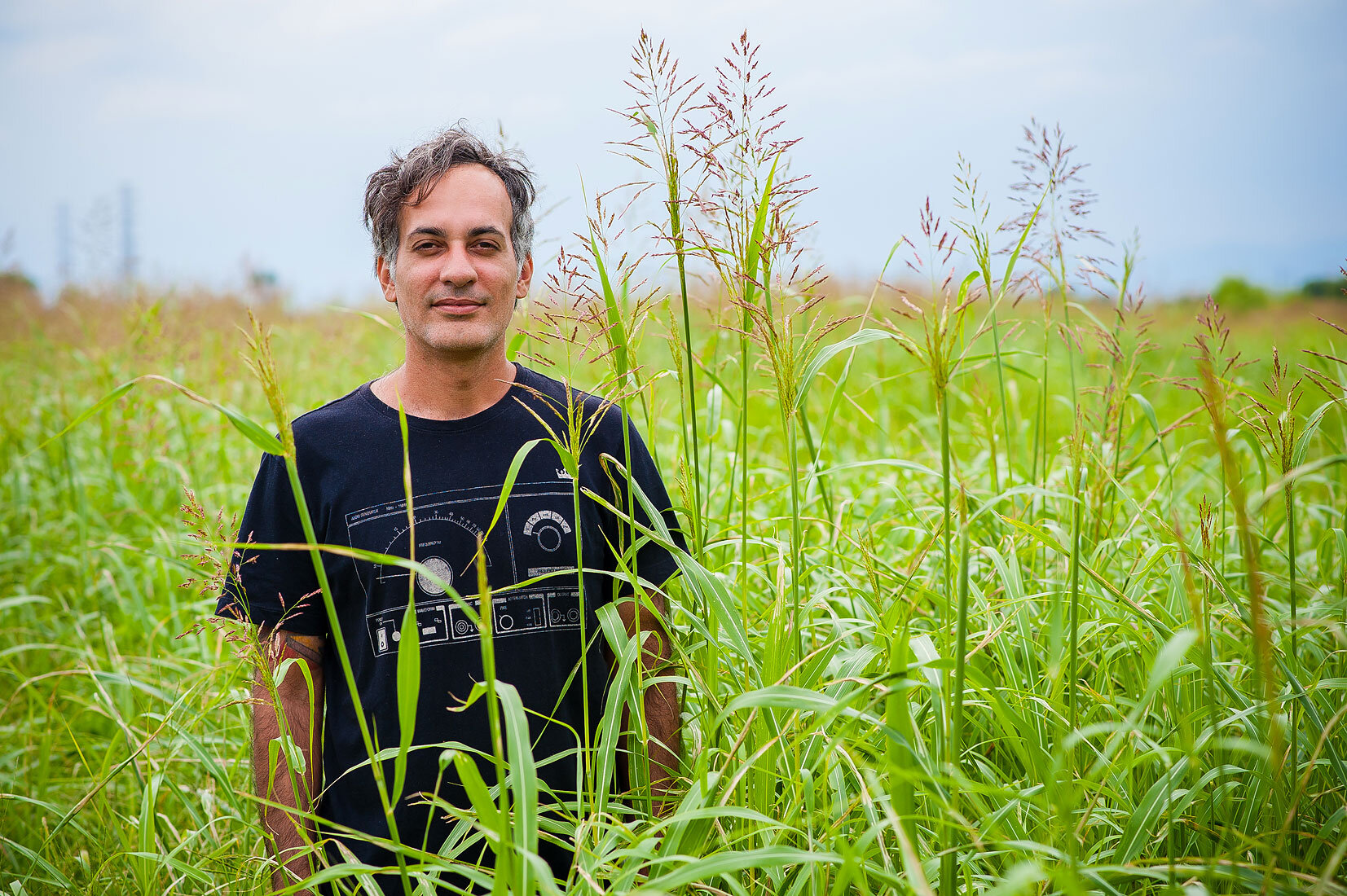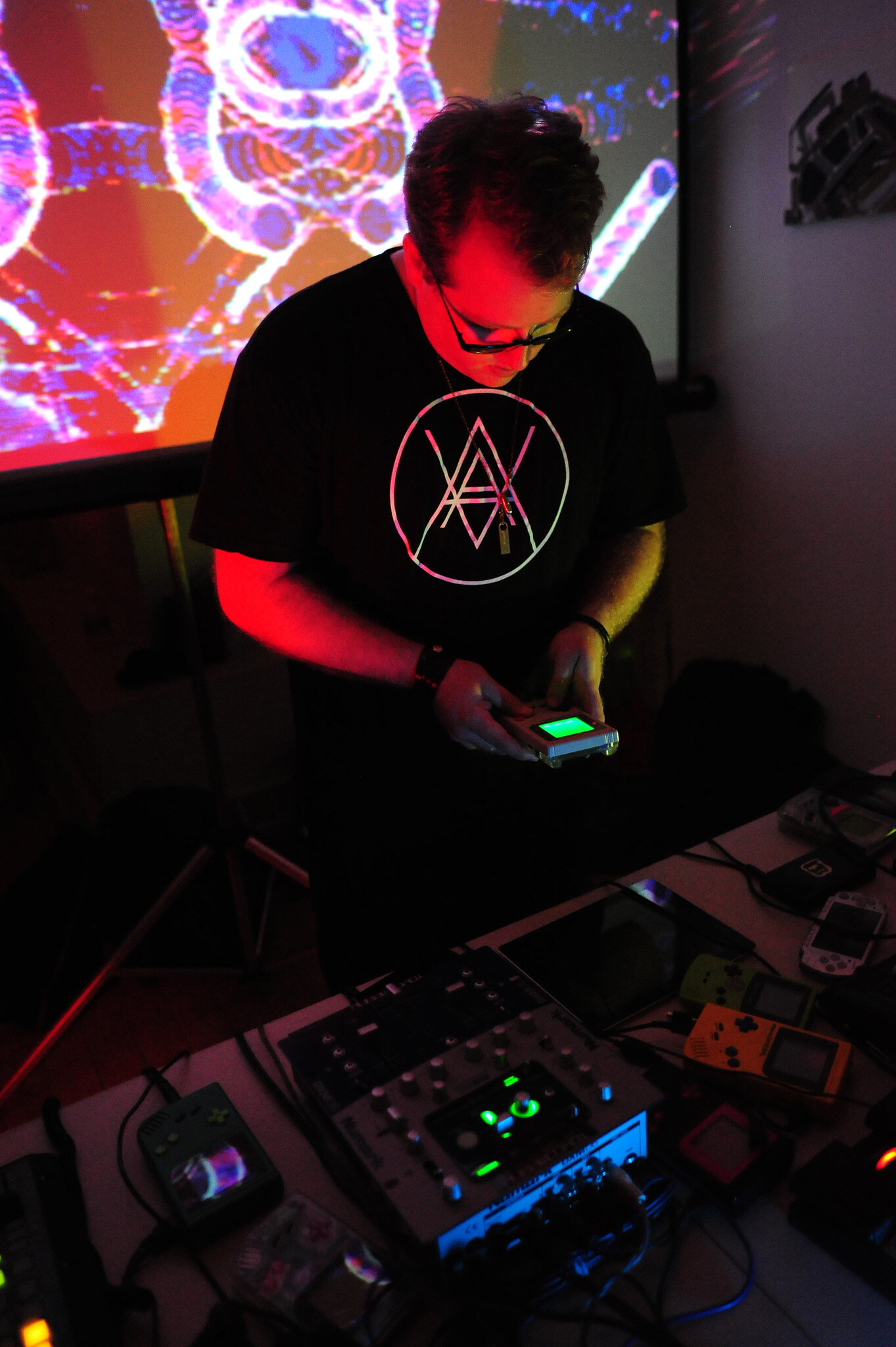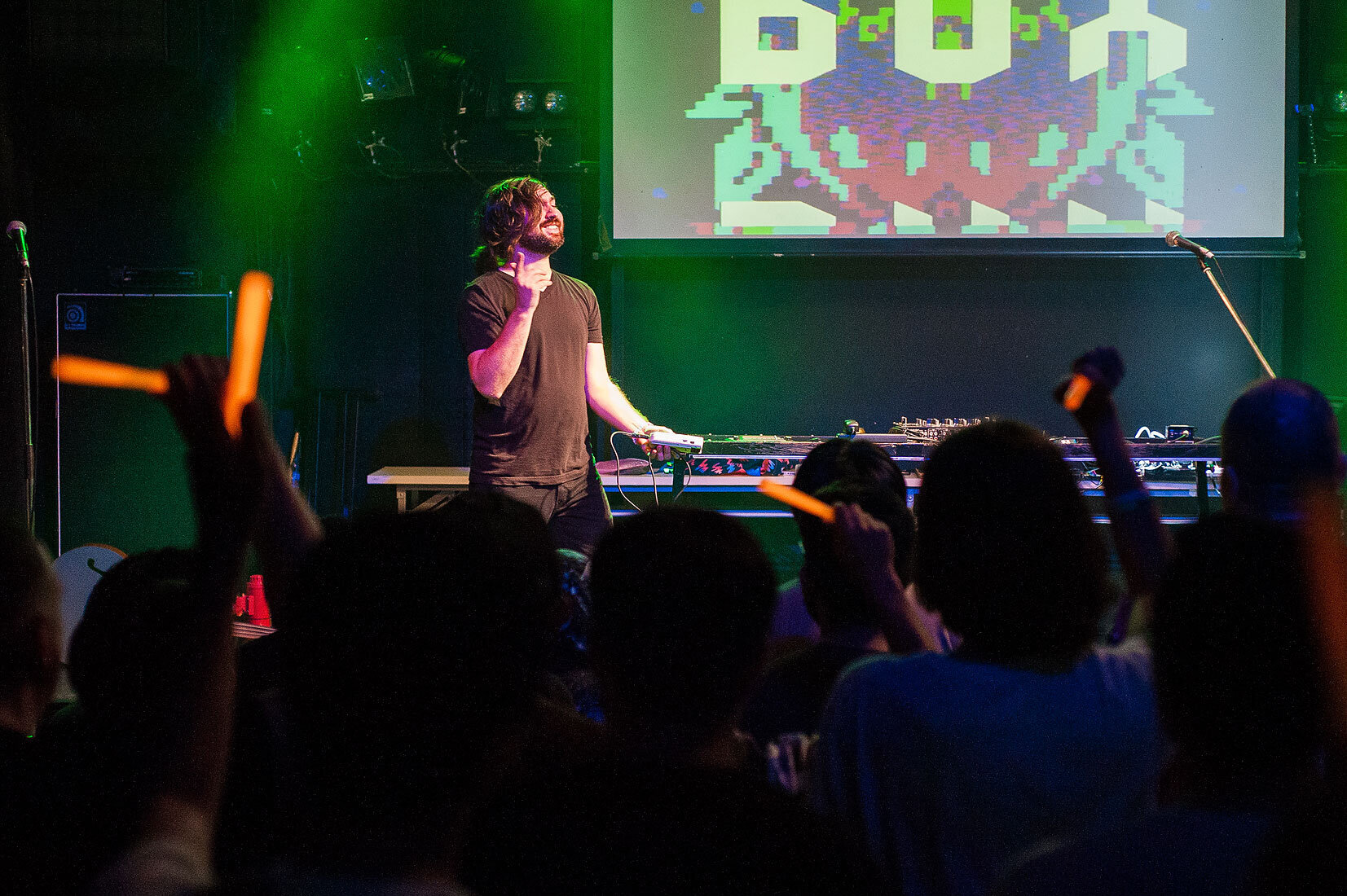Chiptography: How did chiptune find you?
gwEm: Back when I was in my late teens I was really into drum and bass and hardcore rave stuff. I was DJing out in smaller nightclubs and it was going fairly well but somehow I wasn't quite satisfied with it.
Chiptography: You said you were a teenager at this point?
gwEm: I was 17 when I first started to DJ and I bought my first decks and records. A friend of mine at university asked, "Are you into Aphex Twin?" and I was like, "No, who's he?" His stuff is really good and was similar to the stuff I was DJing at the time. Aphex Twin had a record label called Rephlex Records and there was a release on that label called Maxi German Rave Blast Hits 3 by a German duo called Bodenständig 2000. It was completely amazing to me and I listened to it constantly. I got in touch with one of the members, a guy who goes by the name Drx. He was extremely friendly and he told me about this website called Micromusic.net. I eventually met him and he gave me a disc for my Atari with the music software that he used. I thought, "Wow, what a friendly guy." Normally in the drum and bass scene, it's a little bit competitive. No one really wants to help you out. His attitude was completely the opposite so I thought, maybe this is the new thing I've been looking for. I transitioned from DJing into making chiptune and being part of this early community on Micromusic.net.
Chiptography: Were you DJing as gwEm?
gwEm: No, I had a few different DJ names, none of which I was happy with. The first one I came up with was Merlin.
Chiptography: Like the wizard?
gwEm: Like the wizard, yeah. I thought, "Let's set the dance floors burnin'. It's the one they call Merlin." I mean, come on, I was 17. That was pretty cheesy, I thought. My first car was a Vauxhall Nova so another DJ name was NovaNova1 because I thought that was old school techno-y kind of sounding. The thing is, at University my nickname was Gwem. Everyone was calling me that.
Chiptography: Why?
gwEm: It's not a very good story. Basically, we were having some drinks and we were laughing at how English nobility has these double-barrel names with lots of middle names so we kind of added names to our own. Mine was Gareth William Edward Morris which I'm not called. Everyone was like, “That's Gwem.” I was like, “That sounds awful. Don't call me Gwem.” Obviously everyone called me Gwem even more.
Chiptography: You're wrong- that's an amazing story.
gwEm: The name kind of stuck. Anyway, when I started the chiptune stuff I thought, well, I need a new name. The drum and bass thing is over now. Everyone's calling me Gwem so I might as well go with that. I don't like it that much, even now. But I don't know, people say it suits me and it's too late to change it again. It sounds kind of cute and that's nice. It would be nice if it sounded a bit tougher. Merlin and NovaNova1 they were kind of more like, "Bang, yeah." Gwem, it's nice. People like it.
Chiptography: I met you at a Blip Festival. Was the first blip festival you played in New York also with Bodenständig 2000?
gwEm: Yeah, it was 2007, that's right.
Chiptography: How was it to perform with the group that inspired you to get into chiptune at such a significant event?
gwEm: Well actually, my first chiptune show in London was with them as well. Obviously I was super into it. It was really exciting. Those guys are really cool and we get on like a house on fire. They're not so active these days which is a shame but they've gone to other interesting things. I think Bern worked a bit with Björk and Dragan is now a professor of computer art. One of their songs was featured on an advert.
Chiptography: How long was it from when you first discovered chiptune to when you were actually making chiptune?
gwEm: A matter of months probably. I got the Maxi German Rave Blast Hits album and I went to my first chiptune show which was near Spitalfield Market in London. That's where I met Dragan and he gave me the disk. I think I tried it the next day or it might have been two days after. I've still got it actually. He customized the disk with Tipp-Ex and he painted a smiley face and he wrote “Micromusic present” on there. I've still got it somewhere. I started making my first tunes with that. I had an Atari ST when I was a kid so when I heard this album, I could clearly hear that that was the same kind of sound that I was used to with the ST. I knew that that computer was very popular in Germany as well. I got the Atari out and had a go with it. I still have that one. I don't use it to play live though. I've been through several Ataris through the years because they're not really designed for being smashed across the world in a suitcase but they last fairly well. They're quite reliable considering; after a couple of years of gigging they start to break.
Chiptography: What will you do when you run out of Ataris?
gwEm: They're starting to get quite expensive on eBay. I've been lucky in that some people have donated their Ataris in order for me to play. Actually, particularly on the demo scene, they do that. I guess they're happy to see them being used in a constructive way. I'll make things with it. It's not going to sit in some collection. So maybe they like that about it but it's kind of like a contribution to the scene. I'm managing to keep it going. I have had shows where one of them is broken. Instead of having two I'd just have to do the show with one Atari. If it's a guitar based show I quite often just play from my iPhone so that's more reliable. There's a moment in sound check where I take a deep breath and plug it in and hope that it switches on because there's a very real chance that they won't work. At that point, I envy Game Boy musicians because they're cheap and plentiful and you can protect them a lot better because they're smaller and there will be someone you can borrow one from.
Chiptography: Have you ever made music on a Game Boy?
gwEm: Yeah, I did actually. In the Micromusic era. Johan Kotlinski was a friend of mine and so I bought his Little Sound Dj and I wrote some songs on it. I even did one live show which was the Relaxed Beat party in a Paris squat. That was the only party I used a Game Boy live. In the end I stopped just because I didn't like the sound of it. I preferred the Atari so I went back to that. There are some people doing amazing things with a Game Boy but it's just not for me. I like it but the Atari keeps on giving. I have all these other things in my studio. I play them but then go and make music on the Atari.
Chiptography: When did you integrate your guitar playing?
gwEm: While all this was going on there was also the Electroclash scene. Bands like ADULT, Fischerspooner and The Martini Brothers. I was quite into that as well so I thought maybe I'll have a stab at doing an electro song. I had this melody in my head and I wrote the lyrics down as well. It was completely different to the way I work now. I never normally have an idea just appear in my head. That song was called Fuck You Management Wanker which I still play live now. I sent it to Dragan. I said, "I've done this. It's not really chiptune but what do you reckon?" And he said "If you don't upload this to Micromusic I'm going to make an account and do it for you." I think that was my third upload to Micromusic. The two before that, one of them was called Tune 4 My Broken Atari which was actually a fake-bit song. I sampled my Atari and assembled it into a track. Later I remade the song on my Atari because there's no reason why I couldn't have, but I wasn't quite comfortable with the tracker at that point. The second one was a song called Full On! which I sometimes DJ. I find the drums a little bit weak. Maybe I should do a remix. That was a techno-y kind of thing. Then the third one was Fuck You Management Wanker and that was a very popular track. Even though I saw it as more of an electropunk song I thought, well this guitar is now a thing. I only learned and bought the guitar so I could perform that song.
Chiptography: Really? You didn't know how to play guitar before that?
gwEm: No, I never touched it before. I knew the song needed a guitar 'cause it's electropunk and I knew I wanted to have a Flying V. When we were kids at school we would always draw Flying Vs in our school books. I walked into a shop in Guildford and there was a second hand Flying V there and I thought, “perfect.”
Chiptography: It was waiting for you.
gwEm: Yeah, so I bought that and then I thought well I better learn to play this thing. Actually, when I put Fuck You Management Wanker together I still couldn't really play so I was playing individual notes, sampling them, and assembling them in the tracker. I couldn't actually play it but then I was booked for my first gig and I had to learn how to play it properly very quickly. Even the guitar solo is individual notes which I cut up in the tracker and sequenced because I didn't know what I was doing basically. That is actually the only solo that I can play note for note the same as the record because I had to sit down and really learn it for that gig.
Chiptography: It's so surprising because it comes off as if you were playing for years. You have so many guitars now.
gwEm: I have 49 guitars now which is a bit embarrassing.
Chiptography: Why?
gwEm: I don't need that many. I like them as objects. I'd like to give some away to musicians who want to have a guitar and maybe can't afford one.
Chiptography: To me, it just shows your passion for it.
gwEm: Yeah, well I love it and there's nothing more glorious than putting your foot on the monitor and throwing down a big solo. I feel like I could be a much better guitarist than I am though.
Chiptography: You're self-taught, yes?
gwEm: I never had a guitar lesson. Actually that's not true. I had one really weird guitar lesson.
Chiptography: Why was it weird?
gwEm: The original guitarist in this band called The Scorpions was a guy called Uli Jon Roth. He is inspired by Hendrix and he's kind of a hippie. He has all these weird ideas about music. I thought his guitar playing was fantastic because it was very melodic, quite classical, and a bit chiptune actually. I became completely obsessed with him. I saw he did this thing called the Sky Academy where he teaches you. I went and it was a bit disappointing. We didn't actually get to play any guitar. I thought he was going to show me some hot licks and that kind of thing but he was explaining that he sees music as a journey and every time he plays a solo he goes into a meditative state and tries to imagine the guitar solos as different colors.
Chiptography: Wow, that's very far out.
gwEm: It is. He even believes that the different notes of the scale have positive and negative charges so the following note is attracted by the previous note. That was a little esoteric for me. I kind of see what he's getting at. Obviously it works for him. I don't really have the capacity to meditate like that on stage. You still have to be in control and be coordinated. He did give me a couple of good tips. You can consciously slow down your breathing when you play a solo. Before I was just like, "Oh, the solo- I need to play really fast now." He was like, "just try to breathe slowly if you can't meditate and that will give you the control that you're looking for." I thought that was a good tip but he said, "To be honest the only way you're going to progress is if you start meditation." So yeah, that was the only guitar lesson I had. Interesting one.
Chiptography: Very unexpected.
gwEm: Yeah, totally unexpected but he's still my favorite guitarist. I think he always will be. He's not one people talk about a lot but I think if you listen to what he's playing, you'll like it straight away. He also introduced me to the Fender Stratocaster. He used to play a Strat in the Scorpions and it has a different sound to it. It kind of sounds like it's singing, like a bell. I decided to take a leaf out of his book and I did play a Strat for a couple of gigs. The problem is once you start playing the Flying V, it's such a visual impact, everyone's like "Where's the Flying V gwEm? We've paid to see it. We haven't paid to see you play a Strat. Come on, man! Where's the V?" I can never not play the V now.
Chiptography: You can't get away from that guitar just like you can't get away from your name.
gwEm: I can't get away from it but I did put a strat pick up in the neck position of the V to give me kind of the Uli Jon Roth sound for when I'm soloing. The Flying V is played by Rudolf and Michael Schenker in the Scorpions as well so there's another German influence.
Chiptography: Speaking of German influences, you and I have something in common in that we have German ancestors.
gwEm: That's right. My grandmother on my mother's side is German and her parents came over in between the first and second world wars. What I understand was that they were traveling musicians and they moved from Germany to London to start a new life here. It's quite interesting because my own parents aren't particularly musical but I was stoked to find out that in the distant past, members of my family were professional musicians and came from Germany.
Chiptography: Was it the grandmother that got you the Atari?
gwEm: That's right.
Chiptography: That's really special actually.
gwEm: Yeah, it is. I've always felt an affinity with the German approach to music because it's quite mathematical and it also has a kind of sideways looking sense of humor about it that appeals to me. I also just really like German people, German food, and culture. I signed a couple of tracks to a German record label as well. It's probably the place where I've played the most from any other country. I have lots of very good friends there as a result of playing there. I'm really happy about that.
Chiptography: Kannst du Deutsch sprechen? (Can you speak German?)
gwEm: Ja, ein bisschen. (Yes, a little.) I'm super rusty. I was engaged to a German girl for five or six years. I did learn quite a bit but the problem is, unless you use it, you get quite rusty after a while and I was never that good anyway. I like speaking it even in a little way by ordering food, getting around and talking about football. These are things I can do. I tried to get a job in Berlin after I finished my Ph.D. I think that was around 2003 or 2004. There are lots of different freelancers and English speaking people now but back then you needed to speak it properly. The kind of overly familiar German that I knew wasn't really good enough to get a job there. I also spent six months in Munich while I was at university.
Chiptography: Did you go to school there?
gwEm: Kind of. We called it a sandwich year. You study for three years and then you do a sandwich year before you finish off by doing a masters. Part of my sandwich year was in Germany. I worked for a German company in Munich. I didn't learn any German there though because there was an Australian bar close to where I was staying. I was probably only 19 so I just went there. I completely missed the opportunity to speak German properly.
Chiptography: What type of work were you doing?
gwEm: It was the same kind of stuff I do now. It's microchip design, specifically these chips called FPGAs where you can reconfigure the logic on them each time you switch it on. I came across these chips kind of around the same time that I was discovering chiptune actually. I thought it was such a cool concept. It's an electronic circuit but you can change it around however you want. I got super into that and that's what I do professionally now. I did a Ph.D. using them and then after I finished that I had a series of different jobs all doing FPGA related work.
Chiptography: I thought you were in the financial field.
gwEm: That's right. Generally in the UK, if you want to do electronics the jobs aren't in London. They tend to be in places you don't want to live like Slough or Cambridge maybe. I wanted to live in London because that's where all the music is. That leads you on very nicely to finance because they are using these chips. When I first finished my Ph.D. it was the first dawn of financial corporations using this technology for their trading. My Ph.D. was in looking at different ways to perform arithmetic and maths on the device. That mapped perfectly onto what trading firms do which is financial modeling. I got in on that on the ground floor so to speak and that's been quite interesting as well. I quite like the maths and it is very cutting edge as well. It's kind of something like the demoscene, because you have to continually optimize and get faster and faster. Competitors aren't getting any slower. It's intellectually challenging. I work with a great bunch of guys as well. We're always looking at ways to improve it, to get some kind of edge.
Chiptography: It's nice to have a job that challenges you like that.
gwEm: Yeah, it's good. I don't even know if I'd rather make my money entirely from music. That was my dream when I was DJing drum and bass when I was 17/18/19. There's nothing I wouldn't have liked more than to be a pro drum and bass DJ but now I'm not so sure. I think because I'm not dependent on music financially, I can do whatever I like and make weird gwEm music and not worry about if people are going to like it or not. Music is a massive money hole so I need a job to support my music habit.
gwEm on a photo walk.
Chiptography: I find you to be one of those people that has such a great balance of left brain, right brain. You're very artistic but you're also very scientific and equally brilliant on both sides of that spectrum. Speaking of which, I always really enjoyed your photography which is also equal parts art and science. You're working with a machine, chemicals, technology and understanding how light works but you're also making artistic choices in framing, depth of field, and when you release your shutter.
gwEm: I do like photography. There is very much a scientific process involved because you're effectively changing the chemistry of the film by exposing it to light and then it forms an image. It's like magic when you see it happening in the darkroom. When you get film it's completely opaque, it's nearly black. Then you expose it to light and put some chemicals on it and suddenly there's a negative there and it's like, how did that happen? That's very cool. I like to get to the bottom of things. I wasn't really happy taking it to the pharmacy to be developed. I did that with the first couple of rolls but then I got super into it and started making my own developers and developing every film and scanning them myself. I do believe that the process guides the art to an extent as well.
Chiptography: There's a lot of decision making both in the time of shooting and exposing that film with how much light you want to allow in the camera. Do you want a shallow depth of field or a wide one? When you process it, you have more decision making as to how you work with the chemicals. It's an art and at the same time a personal choice with every single image. I always have such a good time looking at your work on Instagram.
gwEm: There is a relationship between photography and music. If you want to make music, the best way is to listen to other people's music and then figure out how it works and apply science and a bit of creativity to that. I think it's the same with photography.
Chiptography: Yeah, I agree with that.
gwEm: When I was first introduced to street photography and the work of the big names like William Eggleston or Moriyama or guys like that I thought it was interesting geometrically but it has a social commentary as well and sometimes a little bit of a sense of humor. You quickly learn stuff that you don't like. Someone like Bruce Gilden is great but I find him quite aggressive in the way he takes pictures. I like it to be a bit more candid, trying to capture people as they are hopefully in some interesting situation. It's just the same with my music in a way. I wrote my own music software and live performance software and I think if you have developed something like that or you understand the science behind what you're doing you can turn that around and use that to your advantage. It can make the end product a bit stronger and more part of you. There's nothing like developing a picture and knowing that you've done the whole process. Maybe you haven't made the film but you made the developer and you developed and printed it. Actually I kind of wanted to make my own film but I got sucked back into music.
Part of gwEm’s lens collection including several vintage lenses.
Chiptography: The equipment you use is pretty impressive.
gwEm: Yeah, it is but it's only because I'm a gearhead. You see amazing stuff even shot on an iPhone if you know what you're doing with it. Essentially you can deconstruct photography and you're literally just pressing a button if you want to be super meta about it. In terms of DJing you can say, a DJ’s job is to choose the next song. So again, you're just pressing play. Clearly there's more to it than that. There is something that has that moment of capturing the decisive moment like Cartier-Bresson. He's another big favorite of mine. He knew exactly when to press the shutter. I wouldn't say I consider myself a photographer your level or definitely not someone like Eggleston or Cartier-Bresson because they devoted their whole lives to it as you're doing. I'm just experimenting with it for a few years.
Chiptography: I think of you as a musician but you're not just a musician. Photography is such a perfect visual medium for you because it is a mixture of a technology, science and art.
gwEm: I totally agree with you. I love the blend of science with art. I know it's very renaissance but it's perfect. I'm an engineer, musician, chemist and a photographer. They go together so perfectly. Obviously, subscribers to my Instagram may not be aware that it was a byproduct of a relationship I was in at the time with a Polish photographer. I found I almost had to because we would be out and about doing boyfriend-girlfriend things and I thought she was alongside me but in fact, she was 100 yards back taking a picture of something. I realized the only way I could be with her was to be doing the same thing and then obviously I got completely obsessed by it.
Chiptography: When artists become involved with other artists, their art starts to blend in a very natural way. You can see the world in a different way because art is a way of communicating. When you're speaking through your lens, your camera, your film or your speaking through guitar or electronic beats and music, it's a different way of relating to the world.
gwEm: It is kind of like being in a relationship with another person in a way. If you're in a couple you do change as a person and I think you learn a different way of seeing and appreciating the world that we're in. I certainly find that different girlfriends that I was lucky enough to be with have always lead me to produce different work. Each time I'm slightly reborn into being a different person than the previous incarnation if you like. Whenever you break up it's like a terrible traumatic reboot. You're never quite the same afterward.
Chiptography: I find that there's a part of my past partners that stays with me. There's a part of them that becomes me even though they're gone, it's still there.
gwEm: I think that's true. I'm not really in touch with any of my former loves. I find it quite painful. By the same token, I still like them and they're all very talented but you get feelings of regret and how it didn't work out and you kind of really wanted it to. I guess these things end for a reason at the end of the day and you learn and evolve as a person.
Chiptography: You have two awards from True Chip Till Death. Can you tell me the story about how you got those?
gwEm: I keep them by my bed so clearly they mean a lot. The first one is an award for Best Chip Software and it goes to maxYMiser which I'm very happy about because maxYMiser was a fuckload of effort. I was working constantly on the first version for about a year. I played very few shows that year because I was focused just on that. I bought myself a very small IBM ThinkPad and I was coding all the time like at airports, at home, on the train. Whenever I had a free moment I was working on maxYMiser. I also got an award for maxYMiser from VORC.org, Hally's website.
Chiptography: Tell me more about maxYMiser. Why did you decide to make your own software?
gwEm: maxYMiser was started after I went to my first demoparty in 2004 and the first version was released to the public in 2005. At that time there were a few good Atari trackers, but they all had different features. My idea was to combine the best of all the trackers into one. The main challenge I faced was not knowing assembly language very well when I started the project, but I was reasonable at the end.
Chiptography: Your software is one of the staple softwares in chiptune today. Who uses your software to make chiptune? How does it feel to see other artists take your software and make their work?
gwEm: Some of the artists using maxYMiser are Dma-Sc, UltraSyd, Xyno and 505. In fact I would say all of the chip musicians working on Atari ST use my software in some way. I’m always delighted to listen to a really good tune done in maxYMiser.
Chiptography: What was your second True Chip Till Death award for?
gwEm: The second award I got from True Chip Till Death was for Artist of the Year. I'm also happy about it because I normally don't win awards like this. I sometimes find that my music can be a bit of an acquired taste. Not everyone likes mechanistic guitar playing and some nerdy guy angrily shouting over the top. I was quite chuffed to get artist of the year. That was really cool. I don't always see myself in the top tier of popular artists like Goto80 or Bit Shifter or someone like that. That year evidently, True Chip Till Death did consider me to be part of that echelon so that's kind of cool.
Chiptography: Is there a chiptune story or a moment that was really special to you?
gwEm: I did a show in India once.
Chiptography: What?!?
gwEm: I went there on business and I was staying at The Grand in Bangalore which is kind of like an average business hotel. There was a hotel bar so I went in there and there was some guy with a Casio keyboard and another guy with a guitar. They were just jamming covers but the covers they were playing were a little bit strange. He played a Deep Purple song and then he played The Mexican by Babe Ruth. I turned around and I was like, "You guys have some serious musical taste." They had a little break and I got talking to them and they asked if I could play. I had some tracks on my phone and I borrowed the guy's guitar and I did a little set there in the hotel bar.
Chiptography: What did they think about your set?
gwEm: They were quite keen. I don't know why they had the Casio. Maybe they couldn't afford a different thing or maybe they liked the sound? I think they appreciated the qualities that it had and the musicality of it. They clearly knew a lot about music so that was nice that they trusted me to do a show. I assumed maybe I was doing their job for them and they just wanted to have a quiet beer for a minute but it was fun. There wasn't really anyone else in the bar. There were some business people and they didn't really look up much. They just accepted it and so I had this weird Indian guitar with this shit amp. I plugged my phone into where the casio was and just did a little set for a half an hour or so. That was a pretty awesome moment.










